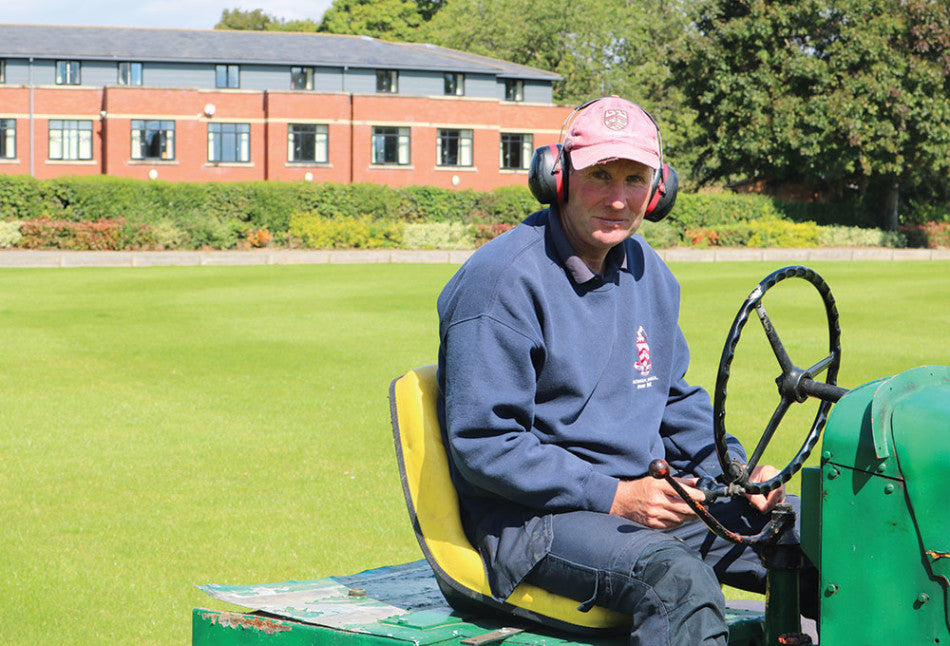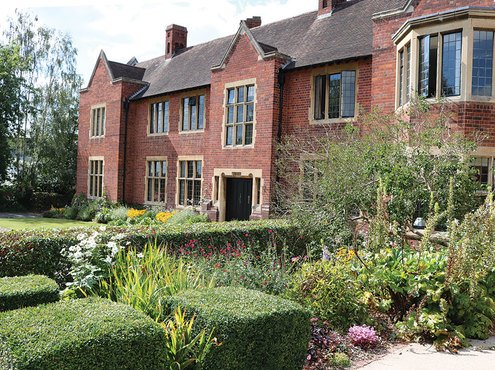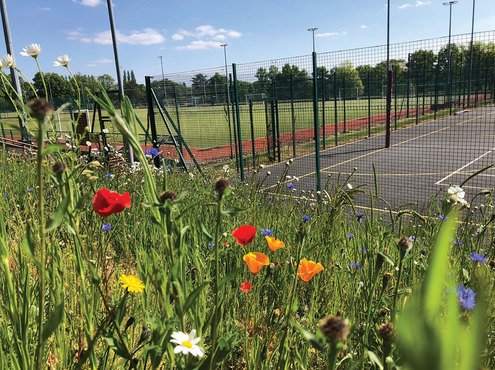Hare to stay at Bromsgrove School
There is no Harry Potter bell tower, no sweeping driveway through undulating fields and the entrances are, frankly, unprepossessing. Despite the millions of pounds invested in recent years, Bromsgrove School keeps one hundred acres of secrets from a casual visitor, hidden like a vast walled garden. Kerry Haywood met Head Groundsman, Richard Hare, to find out more about this 'gentle giant' of a school.

Dating back to the fifteenth century, the buildings are low and set back from nearby roads. An aerial photograph shows that half of central Bromsgrove is taken up by the ancient school and its grounds, but you would never know it from street level.
Richard joined the school in 2013 and, like many, had an interest in sport from a very young age. "I played a lot of cricket and football; from junior teams through to a reasonable standard of adult sport and lots of work on the grounds was carried out by volunteers, which is how I became involved. I eventually moved to Worksop Cricket Club which, up until 1997, hosted Notts first team games. At the time, I was working as a lorry driver in the evenings/nights, working on the ground during the day and I had a young family … something had to give. Back then (and probably still the same today), it was the case that, at lower levels of the industry, the money just was not there and I could earn more working as a lorry driver. However, it was mum who was quick to point out that I was working myself to the bone, so I had to make a decision between the two.
"In 2005, a position became available with contractor Pugh Lewis and I completed a summer with them before being offered a job at King Edward Grammar School in Aston, where I worked for eighteen months. I moved to King Edward Camphill as Head Groundsman and, after a short period, I was offered the position of Deputy Head Groundsman at King Edward Birmingham, which is an independent day school … dare I say some of the top groundsmen in the country all have links there including James Mead, Dave Warner and Andy Richards. Whilst there, I completed my NVQ Level 2 in Horticulture and Level 3 in Sports Turf.


Back to current time, it has certainly been interesting over the past six months, but we have kept busy. We had six members of staff who worked all the way through lockdown, three returned on the 1st of June and the remainder started back late August. Oliver Baldi-Turner and I helped at Barnt Green Cricket Club over the summer as they were struggling. Returning to an amateur environment was actually a revelation … it is a different world and it made me realise how lucky we are to work at a venue with good budgets, support and equipment and it brought home to me how hard it is keep amateur sports grounds up to the standards expected, without the financial backing and lack of equipment.
We have a strong team of fourteen who not only look after the school grounds, but many other sites including: pre-prep (which is around half a mile away from the Senior and Prep School campuses), boarding houses which require landscaping maintenance, Housman Hall Boarding House (which is just off the main school site), The Ryland Centre which offers athletics and a fitness suite and also Winterfold House School - where three of the team maintain the forty-acre site - totalling two hundred acres in total to look after.
The team is split between eight groundstaff and six gardeners. Most people (when they are lucky enough to be offered a head groundsman's job at a school) will have a sports background and can look after cricket squares, prepare a rugby pitch etc. then, suddenly, you're thrust into looking after fourteen hundred trees, fish ponds, forest schools etc. … it's quite a daunting task, so I'm lucky to have such a strong team on the landscape/gardening side as well as the groundstaff! My gardening knowledge is limited, but I thrive on looking after such a well-rounded team and getting the results, we are proud of … right across all the sites.

We conduct a tree survey every two years and the team are experienced to undertake minor work, however we do have Benbow Brothers come in to do all the major works and a local tree surgeon will carry out any work that is too big for our team, but not big enough for Benbow Brothers. We spend a lot of money on trees and we have quite a big budget to maintain them; it is never ending but very rewarding. The oldest tree is some three hundred years old.
The soil is a mixture of sand and clay across the site and it has reasonably good drainage. It still means we do a lot of work on the pitches; even during lockdown, we added three hundred tonnes of sand. It helps that we have all our own major equipment including a Shockwave and Verti-Drain that will be used constantly throughout the winter months. Given the vast amount of building work over the years, the profile does change slightly around the site. Historically, builders used to undertake the landscaping around new and refurbished buildings, but we now undertake all this work, which is something the gardening team enjoy doing.
Despite having good drainage, we do suffer with some areas getting very wet. Carrick Sports have undertaken quite a lot of work for us, which includes a rolling programme of drainage works. Although the work did not take place this summer (because of lockdown), the work has made a massive difference to the areas that have been completed. During a very wet winter last year, we had to cancel a handful of games, so it will be interesting to see how we get on after all the remedial work, once sport gets back to a full timetable. When we are on top of the drainage, I am sure we will then move on to looking at an irrigation system.


Mark Allen, Amenity Specialist from Agrovista Amenity Ltd, will regularly take soil samples and the root growth is generally healthy. In conjunction with Matt Gresty from Limagrain UK, they have compiled an annual programme - entirely based around individual areas' performance and exactly what is required. We buy one-hundred and thirty bags of seed per year and overseed all areas with what Mark calls a 'special Bromsgrove mix' … it is a good job we have a great working relationship.
We do not tend to use many fertilisers on any of the fields, cricket squares being the exception. Most of the cuttings go back in and I am a great believer that 'if it looks healthy, it's doing okay'. Recently, Complete Weed Control (Steve Lovridge) applied a tank-mix fertiliser and selective herbicide, which we aim to carry out twice a year to give it a boost. We also will apply a slow release fertiliser onto the first team rugby pitch and surfaces where the drainage work was completed in the Autumn. We don't suffer too badly from disease so we're lucky in that respect.
The school take sport very seriously, which means a lot of use for all the grass and artificial surfaces. There are also cricket festivals to contend with throughout the summer, which means it is a full year-round schedule. The school has priority over all pitches and courts, but they are also hired out to the local community; particularly the use of the three astro pitches.
Both the groundstaff and gardeners all have specific areas they work in, but they are all proficient across each department. I think it helps encourage pride in their areas and is easy to manage.

Over the past couple of years, projects included the installation of grass cricket nets, which should have been used for the first time this Easter, but were not due to the pandemic so we are looking forward to those coming into play. Currently, one of the buildings projects is due to be finished, so we are busy designing the area around it to landscape.
On the ecology front, we have done so many projects over the last seven years; including the improvement of many of the gardens, tree work, installation of beehives and fruit trees etc. However, I would say the most rewarding has been the introduction of wildflowers areas around the site.
I have always had an interest in wildlife and, after a few discussions with Mark, he invited ecologist John Handley to visit and look at the possibility of introducing areas of interest. Following the initial visit, we actually set up a training session with all staff where we all took a walk around the site and John pointed out areas where we could improve, as well as discussing so many things we had never even considered. I thought it would be more interesting and engaging for the gardeners, but the groundstaff really bought into the concept and how it would improve the overall impression of the school. Now, when we are planning new areas, we are much more informed and consider things such as pollinating plants, incorporating more hedging etc.… It has just made us think differently.
Over the last seven years, we have introduced a wildlife-friendly garden, built an orchard, which consists of fifty different fruit trees all of Midland varieties, and added multiple wildflower beds with mixes. Together, they have not only improved the aesthetics of the site, but also had a huge effect on the amount of wildlife by increasing the number of birds, bats, swallows, buzzards, sparrow hawks nesting etc. We are also responsible for six wildlife friendly ponds and a well-stocked fishpond, which has a large sturgeon, carp and goldfish. Over the past few months, I had to quickly learn how to maintain the fishpond myself, as the member of staff who was responsible for this work was furloughed.


We also have seven beehives on site and constructed a purpose-built area next to the orchard. They have just started to produce honey, so the locals are happy. We have been lucky this year not to suffer with chafer grubs and, as a result, badgers and foxes have not been digging to get to them. As a rule, we do not tend to have much bother from them … touch wood!
We use a local dealer for all our machinery and expect staff to be able to carry out the basic maintenance of a machine including the day to day greasing, cleaning etc. Then, once every two weeks, we have mechanic Chris Perkins come onto site; he completes the servicing of machines, and undertakes any major maintenance work that needs doing.
We are definitely moving towards more battery-powered equipment to reduce noise levels and become more efficient. All new hand-held equipment purchased such as leaf blowers, brushcutters etc. are electric Stihl machines and we are currently looking to replace the two John Deere diesel gators for the electric equivalent. All of the gardeners' vehicles in use for transferring equipment are already electric.
We have a monthly grounds meeting to discuss requirements with all the grounds team, which also includes a representative from the school's Health and Safety department, however these meetings are currently on hold. All the staff have yearly appraisals and they know my office door is always open if they ever need a chat.

I work to a set budget decided by the Bursar, although the pandemic has certainly affected things this year. As I am sure is the case with all industries, it has been hard to plan for the coming year as nobody is sure what is around the corner. I hope that things will get back to some sort of normality soon.
We have a good Bursar who backs us in terms of what the school needs and is keen to invest in people and training alike. Having gone down the apprentice route, Oliver Baldi-Turner, Luke Harper, Jordan Murphy and Luke Wiggett were all offered full-time positions at the end of their qualification.
All our apprentices are fully supported throughout their training and the school encourage on-going courses for their respective departments. They even have a dedicated room where they can complete coursework during quieter times or when required.
Other team members include: Deputy Head Groundsperson - Simon McAulay (ten years' service), Deputy Head Groundsperson - James Towner (nine years), Senior Gardeners; Ashley Cook (ten years), Scott Devereux (eleven years) and Jeremy Hall (nine years), Gardeners; Nigel Bishop (two years), Luke Harper (six years), Jordan Murphy (four years), Steven Taylor (who has been at the school for an incredible fifty years), Groundsmen; Oliver Baldi-Turner (six years), Matthew Sale (five years), Matthew Stoneystreet (eleven years) and Luke Wiggett Groundsman (three years).


Every team member has completed their spraying and some chainsaw certificates and are trained to do their own risk assessments. The pay structure here works well between Levels 2 and 3, which is an added incentive for the team to develop and continue to improve.
It has been strange times for everyone this year, but I feel we are lucky as an industry to work predominantly outside. We have adapted ways of working, in line with both the school and department Covid risk assessments; every team member wipes down a machine after use and there is only one person allowed in the workshop at any one time, they must keep two metres apart and only travel in vans around the site on their own, if possible. However, overall, working outside means we can easily maintain social distancing and comply with government guidelines and we are slowly getting back to a new 'normal'.
What's in the shed
John Deere 4320 compact tractor x 2
John Deere 2653B triple mower
Jacobsen AR-522
Jacobsen AR-3 x 2
Iseki SXG 323
Kubota G16 x 2
Dennis PRO 34R x 2
Allett Buffalo 34
Baroness LM56GC x 2
Dennis FT610 x 3 (various reels)
Invicta cricket roller
Auto-Roller
Redexim Verti-Drain 7316
Imants Shockwave
Sisis Quadraplay
Sisis Multislit 1200
Sisis Rotorake 600HD
Sisis Auto Rotorake MK5 (various reels)
Ford Transit pick up
Vauxhall Combi van
Cushman Hauler Pro x 3
John Deere Gator
Kubota L4240 tractor (loader plus various attachments)
Groundsman spiker
Husqvarna rotavator
Lawnfite 24" rotary mowers x 6
Sthil MB4RTP 21" rotary mulching mower x 6
